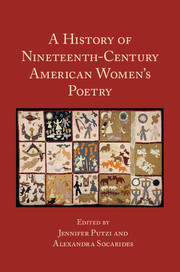Book contents
- Frontmatter
- Contents
- List of Illustrations
- List of Contributors
- Acknowledgments
- Introduction: Making History: Thinking about Nineteenth-Century American Women's Poetry
- PART I 1800–1840, AMERICAN POESIS AND THE NATIONAL IMAGINARY
- PART II 1840–1865, UNIONS AND DISUNIONS
- PART III 1865–1900, EXPERIMENT AND EXPANSION
- Suggested Further Reading
- Index
Introduction: Making History: Thinking about Nineteenth-Century American Women's Poetry
Published online by Cambridge University Press: 21 January 2017
- Frontmatter
- Contents
- List of Illustrations
- List of Contributors
- Acknowledgments
- Introduction: Making History: Thinking about Nineteenth-Century American Women's Poetry
- PART I 1800–1840, AMERICAN POESIS AND THE NATIONAL IMAGINARY
- PART II 1840–1865, UNIONS AND DISUNIONS
- PART III 1865–1900, EXPERIMENT AND EXPANSION
- Suggested Further Reading
- Index
Summary
In July 1837, the noted Quaker writer, minister, and reform advocate, Joseph John Gurney, left his native England and made a series of trips to Canada, the West Indies, and North America. During his time in the United States, Gurney visited southern and northern cities alike, speaking widely upon prison reform, the abolition of slavery, and religious disunity in the Quaker church. On Gurney's departure from Philadelphia, a group of Quaker women presented him with a friendship album titled “The American Offering” as a gift for his seventeen-year-old daughter Anna, who had been left behind in England during her father's journey. The album has 134 gold-edged leaves, and Anna's name is printed on its cover and title page. [Fig. 1] The rest of the pages contain approximately 100 poems, interspersed with prose excerpts and illustrations. While the selections are handwritten, the compilers also clearly had the conventions of print in mind, as they carefully inscribed the titles of poems and often added a relevant illustration.
The opening poem, signed by Elizabeth Lloyd and titled “To Anna Gurney,” declares that the album contains “a wreath” of the “native flowers” of the United States to serve as a “uniting bond” between Anna Gurney and her fellow Quakers. While “The American Offering” itself contains prose and illustrations as well as poetry, Lloyd indicates that it is the poetry in particular that will create and sustain this transatlantic “bond.” In the final stanza, Lloyd marks exactly what Anna can expect to find in this collection of this “country's poesy”:
We will not twine in this bouquet, our country's gayest flowers:
But the purest and the sweetest ones, that bloom in her bowers.
There are no rare exotics here! Oh no – we only bring,
To thee – an unpretending – simple – native, Offering!
Lloyd makes clear that this poetry is not remarkable because it is the “country's gayest,” but because it is its “purest” and “sweetest.” This purity and sweetness is referenced again, yet put differently, in the final line, where she marks the poems as “unpretending” and “simple.” What accompanies this characterization is the insistence that the poems are wholly American – they “bloom in her bowers,” are “no rare exotics,” and, most simply put, are “native.”
- Type
- Chapter
- Information
- Publisher: Cambridge University PressPrint publication year: 2016



